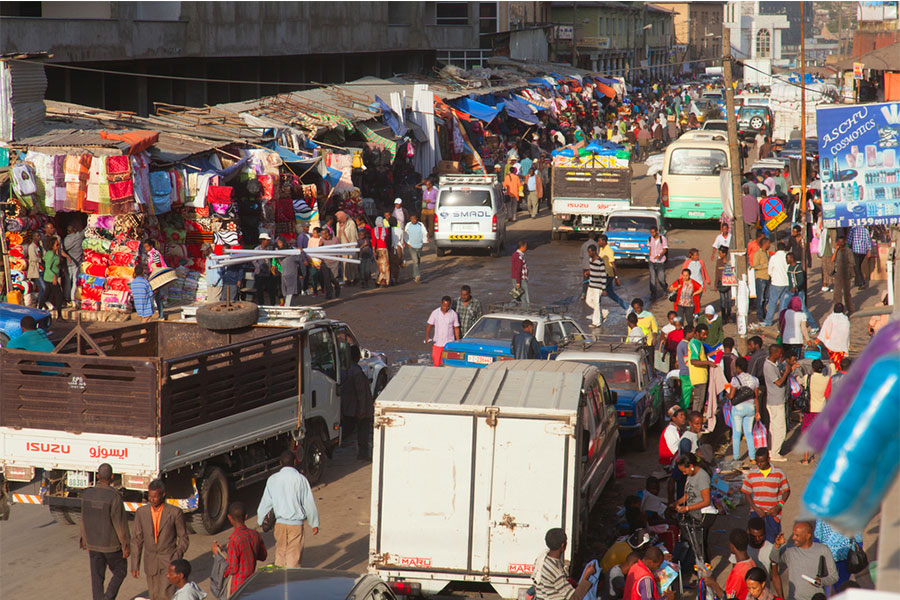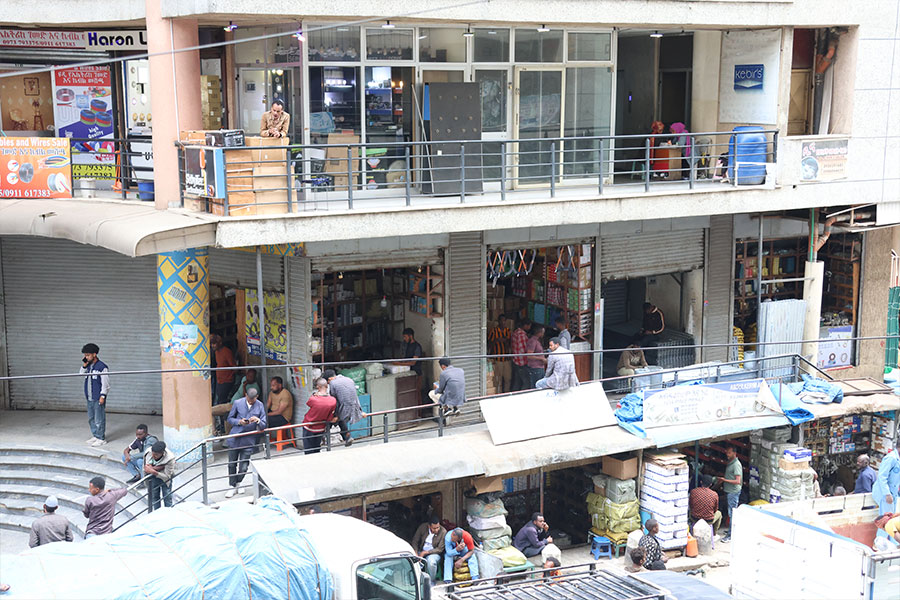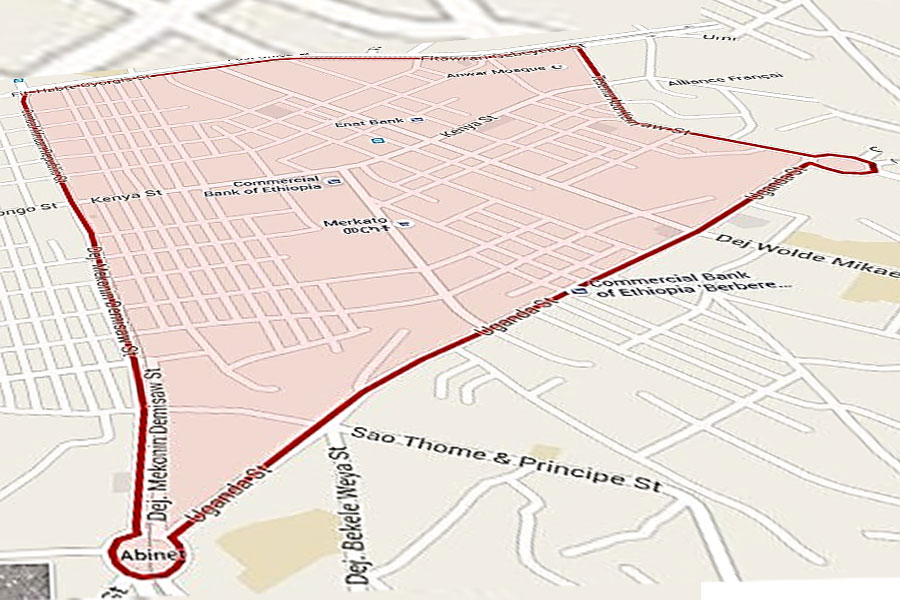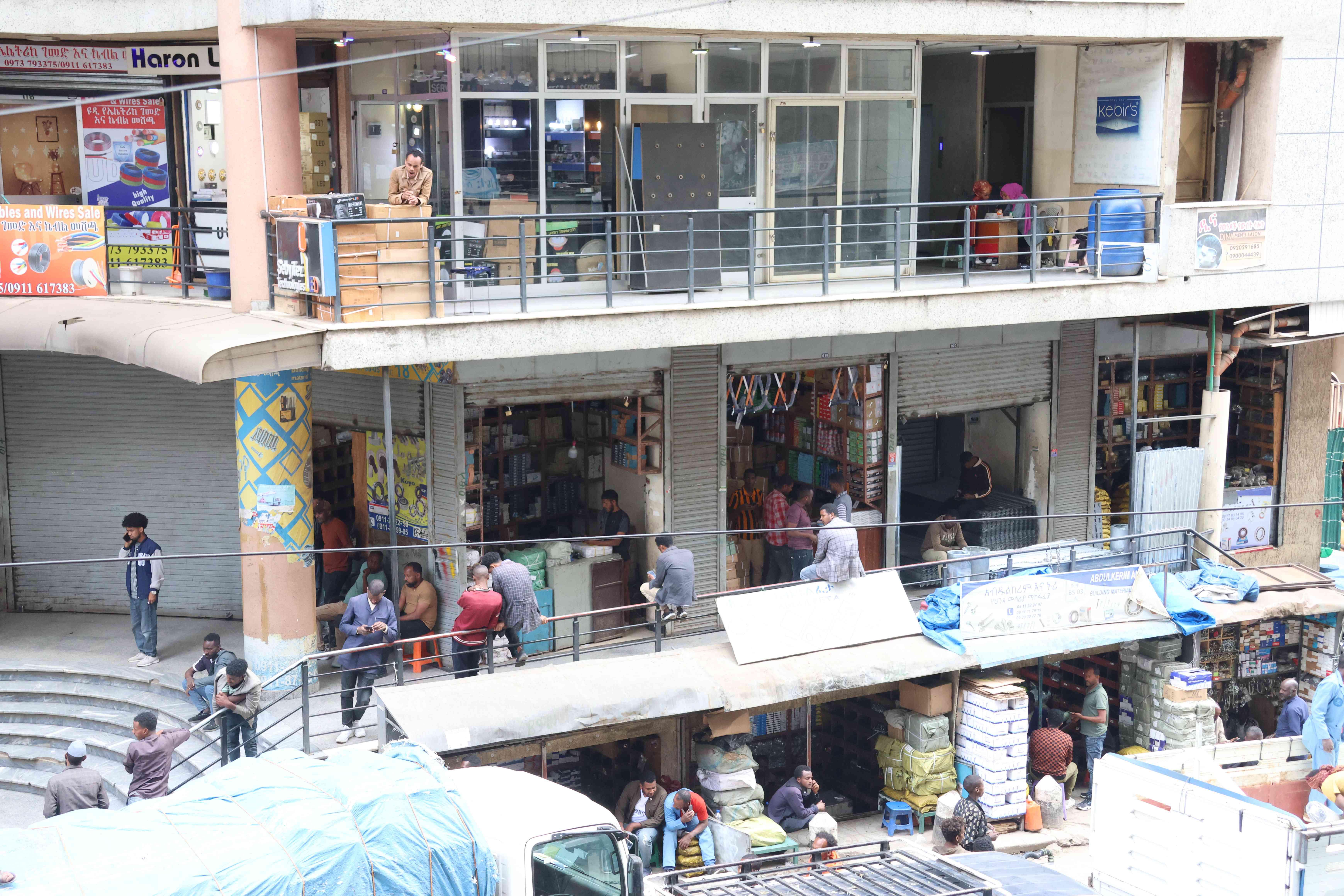
The sight of a porter carrying over 10 mattresses over head while zigzagging through the commotion of pedestrians and vehicles of all types epitomises what Merkato is all about. Africa's largest open-air market is a bustling hub where a diverse array of goods and sellers thrive. From street vendors selling snacks to larger businesses dealing in machinery, the market is filled with an energetic mix of pedestrians, vehicles, and loud advertising. The noise is constant, with multiple traders calling out for attention, making it challenging to hold a conversation. The chaotic environment, characterized by heavy traffic and shouting, encapsulates the vibrant spirit of Merkato. This doesn’t seem possible in real life, but nothing in the area falls under the boundaries of the normal.
In Merkato, it's common for several people to shout simultaneously to grab attention, whether to make way while carrying heavy loads or to advertise their goods. The loud honking of vehicles often disrupts interactions and negotiations among shoppers. As a result, having a meaningful conversation is nearly impossible due to constant acoustic distractions.
Before Addis Abeba expanded, Merkato was the sole marketplace offering a wide range of products. Local shop owners regularly visited to restock and housewives relied on Merkato for affordable groceries. I recall accompanying my mother on these trips, often struggling to carry heavy bags. She would taunt me when I struggled to carry a few kilos of groceries as compared to the porters who carried much larger loads for a small fee.
Visits to Merkato often left me with headaches and nausea due to overwhelming sensory stimulation. The crowded atmosphere led to frequent physical contact, but people generally remained courteous and businesslike, avoiding offense in such interactions. The market fosters a sense of mutual dependence, as everyone relies on one another, making arrogance impractical in this environment.
A visit to the area presents a rich array of smells, from spices and ghee to exhaust fumes and human scents, mingled with animal droppings. Nostalgic aromas of spicy tea and traditional dishes like ful and feta from tea houses, or Shai Beit, evoke memories of the 1980s and 90s. These tea houses, predominantly owned by Arabs in the distant past, provided affordable, nutritious meals for the community. The ambiance was enhanced by nostalgic Sudanese music, with notable music shops like Ambassel and Z contributing to the vibrant soundscape of Merkato.
In Shai Beits, people engage in lively conversations while some escape into daydreams induced by chewing khat. These tea houses symbolize a nostalgic era where young intellectuals, activists, and ordinary individuals shared space, contributing to diverse perspectives during significant political changes from the mid-70s to the 80s. An Amharic novel vividly illustrates Merkato in the early 70s through the eyes of a fugitive fleeing from an oppressive landlord. The protagonist encounters a caring intellectual in the Shai Beit, who introduces him to American Gibi, Merkato's red-light district. This evokes memories of similar market experiences in places like Asigame in Lome, Togo.
Merkato is organized into various districts, each serving specific purposes. For example, Military Tera is known for garments, while Somale Tera is infamous for selling stolen car parts. Shema Tera specializes in traditional dresses, and other sections like Bomb Tera and Gesho Tera cater to other needs. Notably, Minalesh Tera is a unique area where almost anything can be found, including quirky items like single socks and small knick-knacks. A humorous story has it that a porter with his hands full pointed to his chest pocket to indicate he wanted a gursha (a bite given by another), and the vendor served him directly after taking the money from his pocket, showcasing the market's resourcefulness.
In 2010, I observed a shop selling Amole Chew, a salt bar historically used as currency until the 20th century. The shop owner favored rural customers buying in bulk with donkeys, while dismissing a couple of urbanites who only wanted one bar. She viewed the well-dressed city dwellers as less desirable compared to the rural folks, who needed the salt for animal feed, unlike the city dwellers, who sought it for a fancy recipe.
The shopping halls of Merkato, known as Adarash, are lined with shops offering a variety of products. I fondly recall visiting Bethlehem Kids store for birthday clothes and enjoying pastries at Lidet Pastry, creating a cherished ritual. Merkato serves not only as a business hub but also as a place for hospitality and relaxation, featuring historic hotels like Merab, Kagnew Shaleka, and Asfawosen. Additionally, Ras Theatre and Cinema Addis Ketema highlight Merkato's cultural and artistic significance.
Tana Gebeya represents the beginning of modern shopping centers in Addis Abeba, alongside Dir Tera and others, signaling the rise of malls. However, traditional business practices are likely to persist due to the significant economic activity and livelihoods at stake. Merkato's importance to the city's and nation's economy is profound. The renowned poet Tsegaye Gebremedhin captured its essence in his poem "Ay Merkato," portraying it as a cultural and economic hub that highlights both urgency and social injustice. Similarly, singer Abdu Kiar, who grew up in Merkato, expresses his love for the area in his song "Merkato Sefere," reflecting the vibrant community spirit and strong connections among its residents.
Merkato's origins trace back to the Italian occupation, which enforced segregation by designating the Piassa area for Italians and creating Merkato Indigino for locals. After the Italians left, the market flourished as people from various provinces brought and traded agricultural produce. Sections like Gojam Berenda exemplify its role as a melting pot. Autobis Tera, the largest transportation hub for regional travel, is also located in Merkato, where people historically relied on travelers to deliver messages to loved ones before the advent of the internet and mobile phones.
Merkato serves as a spiritual hub for both Christians and Muslims, featuring Saint Raguel Church and the Great Anwar Mosque side by side. It is a place of tolerance and celebration of differences. My childhood visits were overwhelming but now I understand Merkato as a well-organized ecosystem where families thrive and dreams are pursued. Merkato demands resilience and adaptability, rewarding those who navigate its complexities with hard work and negotiation skills. However, it also has its share of pickpockets, employing various techniques, such as the "Dukita" method of swapping bags and the "Shua Shua" distraction tactic, to steal from unsuspecting visitors.
Despite its significant position in business, there are concerns about how long Merkato will remain Addis Abeba's leading commercial center. As new localized markets emerge and the city expands, Merkato’s relevance as the sole trade hub has diminished. Commuting to Merkato has also become more challenging over the years. The market embodies both a historical legacy and a contemporary existence, adapting to current conditions while looking to the future. However, it is clear that Merkato is too large and integral to ever completely fade away.
PUBLISHED ON
Sep 21, 2024 [ VOL
25 , NO
1273]


View From Arada | Apr 06,2019

Fortune News | Apr 13, 2025

Fortune News | Apr 13,2019

Agenda | Apr 13, 2025

Dec 22 , 2024 . By TIZITA SHEWAFERAW
Charged with transforming colossal state-owned enterprises into modern and competitiv...

Aug 18 , 2024 . By AKSAH ITALO
Although predictable Yonas Zerihun's job in the ride-hailing service is not immune to...

Jul 28 , 2024 . By TIZITA SHEWAFERAW
Unhabitual, perhaps too many, Samuel Gebreyohannes, 38, used to occasionally enjoy a couple of beers at breakfast. However, he recently swit...

Jul 13 , 2024 . By AKSAH ITALO
Investors who rely on tractors, trucks, and field vehicles for commuting, transporting commodities, and f...

Oct 11 , 2025
Ladislas Farago, a roving Associated Press (AP) correspondent, arrived in Ethiopia in...

Oct 4 , 2025
Eyob Tekalegn (PhD) had been in the Governor's chair for only weeks when, on Septembe...

Sep 27 , 2025
Four years into an experiment with “shock therapy” in education, the national moo...

Sep 20 , 2025
Getachew Reda's return to the national stage was always going to stir attention. Once...